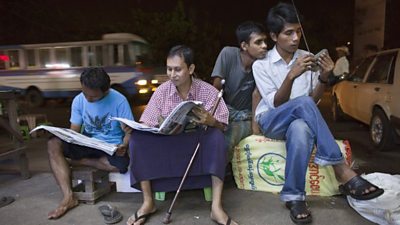Downloads
Burma is experiencing unprecedented reform as its leaders seek to introduce democracy and stimulate development. ΒιΆΉΤΌΕΔ Media Action's research identifies a lack of awareness and discussion of this among citizens, which may prevent them making their voices heard in the reform process.
Publication date: September 2013
ΒιΆΉΤΌΕΔ Media Action is working in Myanmar, also known as Burma, to support improved governance during this period of transition. At the time of writing, the activities underway include the production of a youth-focused radio programme, Lin Lait Kyair Sin, which aims to inform and stimulate discussion on social and civic issues; support to the state broadcaster MRTV during its transition to public service broadcaster; and capacity building of local journalists.
Research approach
In June 2013, ΒιΆΉΤΌΕΔ Media Action surveyed 1,224 people aged 15+, across 11 of Myanmar's 14 states and regions. The survey explored peopleβs awareness of key governance issues and reforms, access to information and media, and attitudes towards and participation in governance processes. The survey was part of a mixed-methods baseline study to inform ΒιΆΉΤΌΕΔ Media Action's approach to supporting governance in the country.
βCitizens will not be truly empowered to participate unless they are equipped with the knowledge, skills and confidence to make their voices heardβ - ΒιΆΉΤΌΕΔ Media Action
Key findings
- Reported awareness of reforms was extremely low, with 62% unable to name a policy, law or service change announced by the government in the past 12 months.
- When asked what they thought were the main issues affecting people in Myanmar at present, 46% said they βdid not knowβ any national issues of importance, and 32% βdid not knowβ any issues affecting their local community.
- Just 42% reported discussing an issue of importance with family members, and 40% with friends. 46% said that they had never discussed an issue with anyone.
- Taking overt action on an issue was even less common. Only 12% reported ever raising an issue with a village or urban ward level official.
Project context
Since the handover of power from a military junta to a semi-civilian government in March 2011, Myanmar has witnessed a series of significant and rapid reforms. Most notable has been the release of political prisoners and the lifting of pre-publication press censorship. President Thein Seinβs Framework for Economic and Social Reform (December 2012) outlines further plans for improved public services, food security, and trade liberalisation in the coming years. The framework states that improved governance is crucial to growth and poverty reduction and that βpeople-centred developmentβ and βpublic participationβ is desired.
Processes such as public consultations will be a crucial step in facilitating such participation. However citizens will not be truly empowered to participate unless they are equipped with the knowledge, skills and confidence to make their voices heard. In Burma, the barriers to this are considerable. More than two thirds of the population live in rural areas, geographically remote from their leaders. A legacy of political oppression means discussion of social issues, let alone political action, is still seen a dangerous pursuit. For many, information on government policies and activities is limited to news broadcasts produced by the state media.
What distance must be travelled to increase citizen engagement in Myanmar's reform process?
Implications and impact
Audiences demonstrated extremely low awareness of reforms and issues affecting people on a national level, as well as within their own communities. The reported level of dialogue, even on local issues with family members and friends, was also extremely low. Whether these findings truly reflect a lack of awareness and activity, rather than a reluctance to demonstrate interest or engagement in social and political matters, is unclear. However, either explanation indicates a challenge to citizens making their voices heard in Myanmar at present, and support to the reform process must address this.
Improving knowledge is a crucial starting point. There is a need for timely, trusted, comprehensive information, which can help citizens to understand the changes they are experiencing, the services they are entitled to, and how planned reforms will affect their lives on the ground. Stimulating discussion at even the most informal, interpersonal level can both enhance knowledge and increase peoples' confidence to participate in processes and decision-making that affects their lives. As long as there is uncertainty around freedom of expression and association, it is crucial to provide a safe space for people to express their views, and highlight the concerns and needs of their communities.
There is a clear role for media and communications. Media can inform the public about social issues and reforms that have a direct impact on wellbeing and livelihoods. It can expose audiences to multiple perspectives, which can deepen their understanding and stimulate discussion locally. Programming that incorporates the voices of people from across Myanmar's states and regions can also alert leaders to the needs of the general population. The capacity of the local media needs to be developed in order to deliver this kind of programming as well as balanced, independent news. This is particularly true for the broadcast media.
